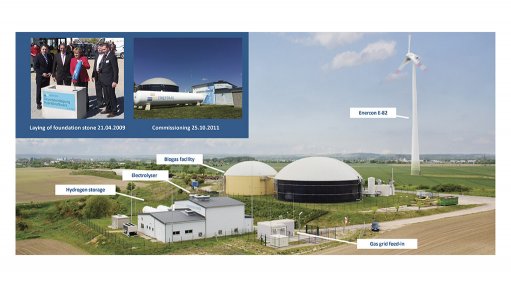
The Hybridkraftwerk, ENERTRAG’s wind-hydrogen plant
ENERTRAG is a German clean-energy company that specialises in electricity and hydrogen from renewable sources. ENERTRAG has subsidiaries in South Africa, France and Poland. The company has become a pioneer in the production of green hydrogen from renewable electricity, with an industrial-scale electrolyser commissioned in 2011. This article highlights some of the company’s activities related to hydrogen fuel cells.
ENERTRAG’s operational wind-hydrogen Hybridkraftwerk
The Hybridkraftwerk (directly translated as Hybrid Power Plant) is ENERTRAG’s operational wind-hydrogen plant located near Prenzlau, Germany, and started operating in October 2011. This hybrid plant generates climate-neutral hydrogen through an electrolysis process using wind energy.
The Heidekrautbahn project – a fuel-cell train powered by 100% green hydrogen
ENERTRAG, Niederbarnimer Eisenbahn, Alstom Transport Germany and Barnimer Energiegesellschaft aim to operate 100% green-hydrogen-fueled rail transport in the German state of Brandenburg by 2023. The diesel-fueled Heidekrautbahn RB27 train from which the project derives its name will be replaced by six new passenger trains equipped with a hydrogen fuel-cell drive and will operate for more than 20 years. The fuel for the trains will be supplied by a newly constructed electrolysis plant, two wind turbines and a solar photovoltaic (PV) plant within close proximity of the refueling station. A funding application has been submitted through the National Innovation Programme Hydrogen and Fuel Cell Technology.
The Referenzkraftwerk project in the coal region of Lausitz
The Referenzkraftwerk, or Reference Power Plant Lausitz, is one of 20 projects shortlisted in the first phase of the Real Laboratories of the Energy Transition competition organised by the German Federal Ministry for Economic Affairs and Energy. The innovative project will be located in the coal region of Lausitz. Referenzkraftwerk will operate with the functionality of a conventional power station, with the exception that it will be fuelled by wind and sun energy, while green hydrogen will work as an intermediary energy carrier. The Referenzkraftwerk will also examine the possible re-electrification of hydrogen in a gas turbine and a fuel cell. Given the looming loss of jobs dependent on coal, the project will also demonstrate ways of securing local energy jobs in the long term through technological change. The 100-million-Euro project is a collaboration between ENERTRAG, Zweckverband Industriepark Schwarze Pumpe, owner and operator of coal-fired power stations in Lusatia LEAG, and Energiequelle.
The Wasserstoffregion Lausitz programme introduces large-scale hydrogen production
The Wasserstoffregion Lausitz programme forms part of ENERTRAG’s mission to drive the Energiewende or Energy Transition through large-scale hydrogen production for transportation, heating and industrial applications in Lausitz. The pilot project features a hydrogen hub with a Power-to-Gas plant of up to 100 MW design capacity which will utilise the existing gas network as a large hydrogen storage. ENERTRAG sector coupling project manager Shaun Pick elaborates: “We’ve honed our knowledge not only through our experience with the operational Hybrid Power Plant but also through active participation in research and innovation projects. For example, we’ve participated in SINTEG, WINDNODE, and Reallabor, which are German innovation programmes. Now we are bringing this knowledge to help build a hydrogen market and drive the Energiewende into sectors that have historically been difficult to decarbonise.”
Green hydrogen for fuel-cell buses in South Africa
ENERTRAG South Africa is one of the partners who have recently submitted a joint proposal to the International Climate Initiative for grant funding of buses driven by green hydrogen. The project proposes that 20 of 125 buses operated by the Gautrain Management Agency (GMA) and currently fueled by diesel be switched to green hydrogen. The green hydrogen fuel will be produced from a combination of energy from wind and solar PV technologies. GreenCape is joint programme coordinator and other partners in the consortium include scientific support through the CSIR, Fraunhofer IEE and IKEM; Navitas; the Industrial Development Corporation; Busmark and the GMA.